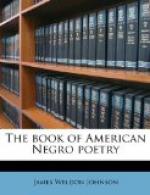Fenton Johnson is a young poet of the ultra-modern school who gives promise of greater work than he has yet done. Jessie Fauset shows that she possesses the lyric gift, and she works with care and finish. Miss Fauset is especially adept in her translations from the French. Georgia Douglas Johnson is a poet neither afraid nor ashamed of her emotions. She limits herself to the purely conventional forms, rhythms and rhymes, but through them she achieves striking effects. The principal theme of Mrs. Johnson’s poems is the secret dread down in every woman’s heart, the dread of the passing of youth and beauty, and with them love. An old theme, one which poets themselves have often wearied of, but which, like death, remains one of the imperishable themes on which is made the poetry that has moved men’s hearts through all ages. In her ingenuously wrought verses, through sheer simplicity and spontaneousness, Mrs. Johnson often sounds a note of pathos or passion that will not fail to waken a response, except in those too sophisticated or cynical to respond to natural impulses. Of the half dozen or so of colored women writing creditable verse, Anne Spencer is the most modern and least obvious in her methods. Her lines are at times involved and turgid and almost cryptic, but she shows an originality which does not depend upon eccentricities. In her “Before the Feast of Shushan” she displays an opulence, the love of which has long been charged against the Negro as one of his naive and childish traits, but which in art may infuse a much needed color, warmth and spirit of abandon into American poetry.
John W. Holloway, more than any Negro poet writing in the dialect to-day, summons to his work the lilt, the spontaneity and charm of which Dunbar was the supreme master whenever he employed that medium. It is well to say a word here about the dialect poems of James Edwin Campbell. In dialect, Campbell was a precursor of Dunbar. A comparison of his idioms and phonetics with those of Dunbar reveals great differences. Dunbar is a shade or two more sophisticated and his phonetics approach nearer to a mean standard of the dialects spoken in the different sections. Campbell is more primitive and his phonetics are those of the dialect as spoken by the Negroes of the sea islands off the coasts of South Carolina and Georgia, which to this day remains comparatively close to its African roots, and is strikingly similar to the speech of the uneducated Negroes of the West Indies. An error that confuses many persons in reading or understanding Negro dialect is the idea that it is uniform. An ignorant Negro of the uplands of Georgia would have almost as much difficulty in understanding an ignorant sea island Negro as an Englishman would have. Not even in the dialect of any particular section is a given word always pronounced in precisely the same way. Its pronunciation depends upon the preceding and following sounds. Sometimes the combination permits of a liaison so close that to the uninitiated the sound of the word is almost completely lost.




